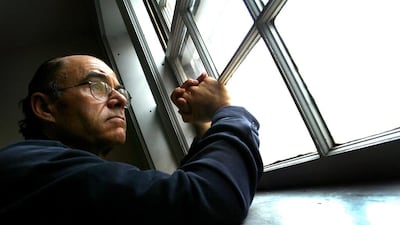A couple of pages into The Rope, Kanan Makiya's powerful novel about Iraq during the first four years of American occupation, it becomes clear that the rope of the title is the one that hanged Saddam Hussein.
Makiya, himself an Iraqi dissident and author of best-selling books critical of Saddam, repeatedly raised his voice in favour of the US invasion of Iraq in 2003 that brought about the end of his regime.
Now somewhat controversially depicting recent events, Makiya draws us in by taking us back: “the Tyrant” is dragged out of his hole – “Caught like a rat,” according to a US general – and taken into custody; later he is defiant in court and stoic on the platform above the trapdoor. After witnessing the hanging, the book’s nameless narrator tells his friend and comrade in arms Haider that “what happened today in that execution hall is not an ending; it is a dreadful beginning”.
However, the focus of Makiya’s book is the bloody mayhem that erupted not after Saddam’s death in 2006 but after his downfall in 2003.
Having left his mark with his striking opening, Makiya rewinds to the day US forces took Baghdad. In his hometown of Najaf, the narrator comes across a corpse in an alley. His uncle, who has helped to raise him since his father disappeared in 1991, tells him the dead man is an American agent. “They are everywhere,” his uncle says. “We must be vigilant.” Soon he has persuaded his impressionable nephew to join the ranks of the Shiite Army of the Awaited One and fight “the Occupier”.
Makiya’s young narrator is thrust into a world of lies, betrayals and destruction. As sectarian violence plays out on the streets he admits that: “A part of me was undergoing burial while another was assimilating into the chaos all around.”
In 2004, he and Haider take up arms as snipers and experience “a savage joy” at shooting US soldiers. He swaps Najaf, a place his mother calls the “City of the Dead”, for Baghdad, in his eyes “a city of ghosts”. But as the brutality intensifies – “The Sunni knife was pitted against the Shi‘a drill” – he becomes appalled by the “justice” meted out by his militia and Haider’s psychopathic ruthlessness.
At the end of the book our narrator is a somewhat changed man – not because he has seen the blood on his hands and the error of his ways, but because he has discovered the startling truth about his missing father. Mercifully, Makiya resists serving up a tidily convenient conversion: enlightenment comes as a convulsive shock rather than a contrived epiphany.
By keeping his creation torn and anguished as he digests unpalatable facts, Makiya forces us to sympathise, to see his character as a human as well as a soldier, a lost boy gulled into believing anything and duped into doing the dirty work of others.
As might be expected from a fictionalised account of a time of anarchy and carnage, The Rope is no cheery read. A flick through its chapter titles gives more than a hint of what lies ahead: "Car Bomb", "Minarets and Kalashnikovs", "An Intimate Killing".
But the bloodshed doesn’t prevent it from being edifying and engaging. Najaf and Baghdad, two beleaguered cities of checkpoints, ruins, suicide bombings and pilfered electricity, are vividly rendered.
There is acute tragedy in the form of young, innocent men corrupted into vengeful foot soldiers or sadistic prison guards (each one a “changeling fathered by the country’s demons”), and even more in the suffering of their victims. And the narrator’s intense face-off with the Tyrant before his execution makes for a thrilling denouement.
If the book’s main weakness is its occasional dense, exposition-heavy passages clogged with the make-up and varying doctrinal differences of rival militias, political factions and clerical Houses, its considerable strength is the relationship between the narrator and his cunning uncle.
It is this mentor and provider “and in the end commander” who tells him that his father was a dreamer for believing in tolerance towards all countries and cultures – “a far bigger fantasy than the Tyrant’s pan-Arab nation”. Instead his nephew should hate “the one who is not you, the infidel or the foreigner”.
Capping the novel is a 20-page personal note in which Makiya writes that “Iraq was the dress rehearsal for what befell an entire region”.
With this in mind, The Rope becomes more than the sum of its parts, for it not only casts an isolated shadow, it forebodes a far wider darkness.
Malcolm Forbes is a freelance reviewer based in Edinburgh.

